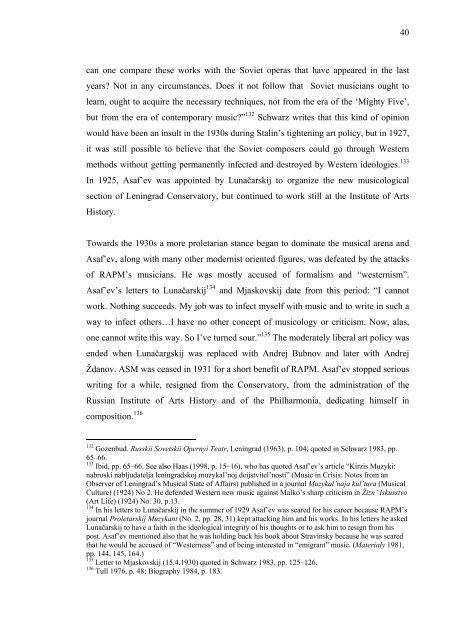Boris Asaf'ev and the Soviet Musicology - E-thesis
Boris Asaf'ev and the Soviet Musicology - E-thesis
Boris Asaf'ev and the Soviet Musicology - E-thesis
You also want an ePaper? Increase the reach of your titles
YUMPU automatically turns print PDFs into web optimized ePapers that Google loves.
can one compare <strong>the</strong>se works with <strong>the</strong> <strong>Soviet</strong> operas that have appeared in <strong>the</strong> last<br />
years? Not in any circumstances. Does it not follow that <strong>Soviet</strong> musicians ought to<br />
learn, ought to acquire <strong>the</strong> necessary techniques, not from <strong>the</strong> era of <strong>the</strong> ‘Mighty Five’,<br />
but from <strong>the</strong> era of contemporary music?” 132 Schwarz writes that this kind of opinion<br />
would have been an insult in <strong>the</strong> 1930s during Stalin’s tightening art policy, but in 1927,<br />
it was still possible to believe that <strong>the</strong> <strong>Soviet</strong> composers could go through Western<br />
methods without getting permanently infected <strong>and</strong> destroyed by Western ideologies. 133<br />
In 1925, Asaf’ev was appointed by Lunačarskij to organize <strong>the</strong> new musicological<br />
section of Leningrad Conservatory, but continued to work still at <strong>the</strong> Institute of Arts<br />
History.<br />
Towards <strong>the</strong> 1930s a more proletarian stance began to dominate <strong>the</strong> musical arena <strong>and</strong><br />
Asaf’ev, along with many o<strong>the</strong>r modernist oriented figures, was defeated by <strong>the</strong> attacks<br />
of RAPM’s musicians. He was mostly accused of formalism <strong>and</strong> “westernism”.<br />
Asaf’ev’s letters to Lunačarskij 134 <strong>and</strong> Mjaskovskij date from this period: “I cannot<br />
work. Nothing succeeds. My job was to infect myself with music <strong>and</strong> to write in such a<br />
way to infect o<strong>the</strong>rs…I have no o<strong>the</strong>r concept of musicology or criticism. Now, alas,<br />
one cannot write this way. So I’ve turned sour.” 135 The moderately liberal art policy was<br />
ended when Lunačargskij was replaced with Andrej Bubnov <strong>and</strong> later with Andrej<br />
Ždanov. ASM was ceased in 1931 for a short benefit of RAPM. Asaf’ev stopped serious<br />
writing for a while, resigned from <strong>the</strong> Conservatory, from <strong>the</strong> administration of <strong>the</strong><br />
Russian Institute of Arts History <strong>and</strong> of <strong>the</strong> Philharmonia, dedicating himself in<br />
composition. 136<br />
132<br />
Gozenbud. Russkii Sovetskii Opernyi Teatr, Leningrad (1963), p. 104; quoted in Schwarz 1983, pp.<br />
65–66.<br />
133<br />
Ibid, pp. 65–66. See also Haas (1998, p. 15–16), who has quoted Asaf’ev’s article “Kirzis Muzyki:<br />
nabroski nabljudatelja leningradskoj muzykal’noj deijstvitel’nosti” (Music in Crisis: Notes from an<br />
Observer of Leningrad’s Musical State of Affairs) published in a journal Muzykal’naja kul’tura (Musical<br />
Culture) (1924) No 2. He defended Western new music against Malko’s sharp criticism in Žizn’ Iskusstvo<br />
(Art Life) (1924) No. 30, p.13.<br />
134<br />
In his letters to Lunačarskij in <strong>the</strong> summer of 1929 Asaf’ev was scared for his career because RAPM’s<br />
journal Proletarskij Muzykant (No. 2, pp. 28, 31) kept attacking him <strong>and</strong> his works. In his letters he asked<br />
Lunačarskij to have a faith in <strong>the</strong> ideological integrity of his thoughts or to ask him to resign from his<br />
post. Asaf’ev mentioned also that he was holding back his book about Stravinsky because he was scared<br />
that he would be accused of “Westerness” <strong>and</strong> of being interested in “emigrant” music. (Materialy 1981,<br />
pp. 144, 145, 164.)<br />
135<br />
Letter to Mjaskovskij (15.4.1930) quoted in Schwarz 1983, pp. 125–126.<br />
136<br />
Tull 1976, p. 48; Biography 1984, p. 183.<br />
40

















